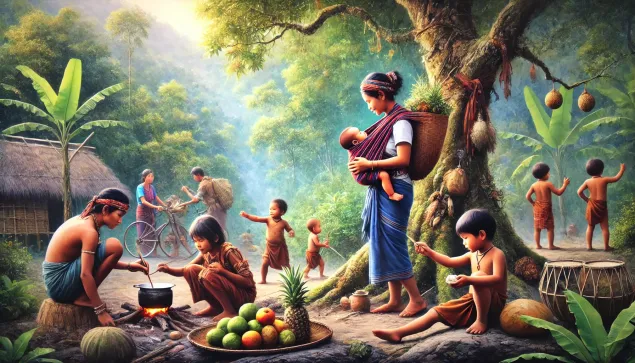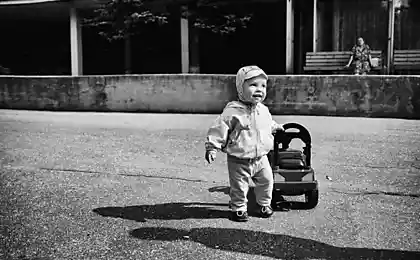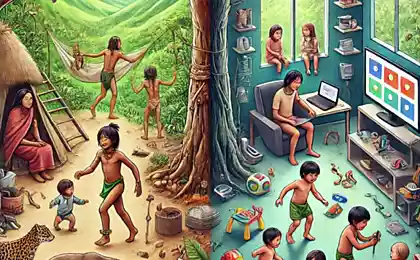599
Differences in the education of "wild" tribes and "civilized" society from birth. Part 3

Condemnation, especially reinforced by the stigma of “forever you...”, is also extremely bad for the child, because it implies that he is expected to behave unsocially. "Oh, you squirrel!" Lost the mitten again! or "What should I do with you!" or a hopeless shrug, or a common statement like "All boys are tomboys," implying that children are inherently bad, or just a facial expression showing that bad behavior was not a surprise, all of this is as devastating to a child as surprise or praise for social behavior.

By exploiting a child’s need to do what is expected of them, adults can destroy their creativity. Suffice it to say something like: “Better paint over the linoleum in the hallway, otherwise you will paint the entire parquet.” The child will note to himself that to draw means to “paint,” and he will need a truly extraordinary inspiration to draw something beautiful, contrary to his mother’s expectation. No matter how many adults express their child’s neglect by smiling or shouting, the result will be the same.
If we assume that a child is inherently a social being, we need to know his innate expectations and tendencies and how they manifest themselves.

By preventing little girls from fulfilling their deep-rooted desire to care for their babies and by directing them to caress dolls instead of real children, we are doing a disservice to the future children of these girls. The little girl, brought up in the conditions of Rusla, has not yet learned to understand the instructions of her mother, but already behaves towards babies exactly as they demand from time immemorial. When she grows up, she will already be so well versed in childcare that it would never occur to her that the child can be treated differently or that it should be considered. Since she spent her entire childhood with young children in her family or with neighbors, when it comes to marriage, she has nothing to learn from Dr. Spock, her hands are strong and can carry a child, and she knows countless ways to hold a child when cooking, digging in the garden, washing dishes, sweeping the floor, sleeping, dancing, bathing, eating or doing anything. In addition, she will feel in her gut what actions do not correspond to her nature or the nature of the child.
Since the girl messed with real children, not with dolls, she never got tired of it. It seems that caring for babies is the most powerful expression of human nature, and the infinite patience and love that babies need is embedded in every child, whether a girl or a boy.
The fact that a child is physically weaker and dependent on adults does not mean that he can be treated with less respect than an adult. Shchetinin says this very clearly: “Assume dignity in a student before they appear, respect his personality and communicate with him on an equal footing.”

We must not doubt the child’s willingness to cooperate.
In my memory there is a very vivid memory of how once for the morning on February 23 in kindergarten, my parents and I on behalf of the teacher together made five sea caps for boys. They were almost real, and we wrote some words around the rim in yellow paint. I now realize that I don’t think I could have written these letters carefully (although I already knew all the letters), but I have a clear feeling that we did it with the whole family and with pleasure.
If a child is given the opportunity to choose from a very early age, then his ability to reason develops remarkably well, whether it is making decisions or seeking help from his elders. Caution corresponds to the level of responsibility, and therefore errors are minimized. The decision thus made does not go against the essence of the child and leads to harmony and pleasure for all concerned. I remember when I was seven years old, I could take a bus to the other side of the city to the dance section or to the clinic for periodic examination, because I had a chronic illness for some time. My parents trusted me because they both worked all day. I developed a sense of independence and responsibility for my life. It was very strange for me to see that some children up to middle school were taken to school every day by their parents. And I know that these children were not at ease. Unfortunately, such overly intrusive care from the mother or father in childhood creates self-doubt and irresponsibility in the future.
Also, I was always surprised if one of the women was afraid to leave two or three-year-old babies with older children (if the age difference is small), because in my experience it happened all the time with the younger sister, and there was no emergency.
For anyone who tries to put the principle of continuity into practice in a civilized society, perhaps the most difficult thing will be to trust the child’s ability to take care of his own self-preservation. Most will at least look at children with fear, at the risk that the child will catch this look and interpret it as an expectation of his inability to protect himself.
Children of each age group master concepts corresponding to their level of development, following the heels of older children until they themselves achieve a complete understanding of all the turns of speech and acquire the ability to understand adults and the entire content of speech that they have heard since infancy.
In our system, we try to guess what and how much a child can learn. As a result, there are contradictions, misunderstanding, disappointment, anger and generally loss of harmony.
If adults try to make a child understand something, there is a conflict between the child’s level of cognitive ability and what he feels is expected of him. If children are allowed to listen to and understand what they can understand at their developmental level, there is no indication of what information adults believe the child should learn, which prevents this destructive conflict.
2. Consequences of Lack of Required Child Experience in Adulthood
If the principle of continuity has not been observed and subsequent events in a person's life do not correspond to the nature of the experience that caused his behavior, he is inclined to influence events so that they become similar to the original experience, even if it is not in his interests. If he is accustomed to loneliness, he will unconsciously arrange his affairs in such a way as to feel a similar loneliness. All attempts on his part or on the part of circumstances to make him more or less lonely will be met with the resistance of a man inclined to preserve his stability.
The person tends to maintain even the usual level of anxiety. If it turns out that there is nothing to worry about, it can cause a much deeper and sharper excitement.
For someone who is used to living on the edge of the abyss, complete security and tranquility become as unbearable as falling to the bottom of the abyss. In all these cases there is a tendency to maintain what should have been the full well-being laid down in infancy.
Attempts to radically change the established social circle or view of success and failure, happiness and unhappiness meet the resistance of the stabilizers built into us, and our intentions fly away from them like peas. Volitional effort is rarely able to break the strength of habit.
For life to be tolerable, some people must often fall into poor physical condition (proneness to accidents), while others need to become lifelong cripples in order to survive in conditions of great need for maternal care, entertainment or punishment. Others have to make themselves fragile in order to maintain the family attitude they need; they only really get sick when others treat them too badly or too well.
One such example is one of my relatives. She was born the third child in the family and remembers about her childhood that her parents always paid more attention and care to her older sister and brother, in addition, her sister was always protected from any chores and physical exertion due to poor health. Since the youngest daughter was not a very desirable child (which, by the way, she accidentally overheard the conversation of adults), she was always shifted to household chores, she got the clothes worn by her sister, and often all the best food went to the older brother and sister (it was the 50s, with food was tense). According to her stories, in order to attract the attention and affection of her mother, she often ate icicles and snow in the winter to get sick and be treated like an older sister. But by nature she was a healthy person, and she did not manage to get sick.
Later, she married a man, an orphan with living parents, and unconsciously cared for him as her child (because he, in turn, did not get the experience of maternal caresses), which she was quite satisfied. Then they had three children, she managed to create good human relations between her sons and her, but when they became independent, she developed all sorts of diseases. She became a frequent hospital patient. Adult sons showed maximum care and attention to her. In many ways, the cause of illness was and still is a relationship with her husband, but while the children were young she could take care of all four men, while, according to her, her health was strong. That is, the time has come when close people were able to make up for her lost experience, which she unconsciously took advantage of.
Thus, every person in childhood unconsciously creates his own stereotypes of behavior, norms, standards of behavior for life, with which he will compare everything else, with which he will measure and balance everything. Its stabilizing mechanisms will work to maintain these norms.
Such useful mechanisms become for some a cruel trap, a kind of life imprisonment in a portable prison, which they do not even realize.
Most people of my generation, as children, did not get the full experience in the hands of their mother, so many of us have a need for proof of their correctness and attractiveness, we continue to subconsciously look for these impressions and experiences in a certain order laid down by nature. The unsatisfied need for impressions of the "manual period" awaits its satisfaction and leaves an imprint on the further development of the body and thinking.
This can manifest itself in a variety of forms.
Self-hatred and insecurity are common in our society. The only difference is the degree of neglect, which depends on when and how much the lack of different experiences affected our innate qualities.
The feeling of happiness ceases to be a normal state of a person and instead becomes his goal. A goal that a person tries to achieve by making all sorts of efforts that bring short, but sometimes longer, results.
The most common manifestation of a lack of manual experience is perhaps a deep sense of anxiety and discomfort in the here and now. A person feels a vague anxiety, as if something important but elusive, missed and forever lost.
The thirst for this is often expressed in the fact that a person associates his well-being with the achievement of some event or possession of an object in the foreseeable future; in other words, “I would be satisfied if only...” Then comes the desired event or object, such as a new suit, a new car, a promotion or raise, another job, the opportunity to go somewhere on vacation or move to the desired place for good, a husband, wife or child (if they are not already) to apply their tender feelings.
When the desired is achieved, this foreseeable future, as unattainable as the mother, is soon filled with another “if only.” The pursuit of the distant desire becomes a new stage in the achievement of lost well-being – well-being in the here and now.
Human life energy is supported by the hope of achieving a number of goals in the future. The height of the bar of the desired goals depends on how much the mother deprived a person in infancy of impressions of the “manual period”.
Oddly enough, most fabulous rich people strive to become even richer, people in power dream of being more omnipotent, so their longing and passionate desire takes shape and direction. But those few who have achieved everything, or almost everything, are forced to live with insatiable longing and thirst.
This is most obvious in marriage. The constant childhood need of both partners for maternal attention is in the phrase: “I love you, I want you, I can’t without you.” The first two statements are quite normal for a mature person, but the usual “I can’t without you”, although accepted in our society and even has a romantic connotation, implies the need to be a child surrounded by maternal care and warmth.
Often, there is a desire to be the center of attention (that is, a transformed need for the attention that an infant needs, but not an adolescent or an adult), and partners take turns playing the role of mother.
Divorces between husband and wife can also be seen as an echo of lost experiences in childhood. For people with “high demands”, those who were so deprived of attention and impressions in their infancy that they can no longer accept another with their needs and needs, for such people, finding a permanent partner is an endless and fruitless process. They were betrayed in early childhood, left to drown in a sea of deep and desperate longing for something unspeakable. The fear of another betrayal is so great that when such a person finds a potential partner, and even creates a family with him, he runs in horror, realizing this, so as not to expose himself and his partner to repeated testing by “betrayal” and once again not to remind himself that he is not unconditionally loved, just as his inner child requires. However, due to the closure of the circle of “escapes from betrayal” and obsession with oneself, continuous “betrayals” are committed. Many continue to change partners as much as possible, not getting along with “ordinary” men or women and trying to find a “perfect” relationship with a person more important than themselves.
Difficulties in finding a suitable partner are aggravated by the peculiarities of our culture, for example, love characters created by television, novels, advertising. Idealized and embellished characters created by cinematography create the illusion in the viewer that these are the very “right” and “gentle like mother” people. For some reason, we imbue them with childhood trust and endow actors with an aura of perfection and the qualities of their characters.
In the relationship between sisters and brothers, the lack of full experience in infancy turns into constant rivalry, envy, jealousy of parents and even sometimes hatred between them.
The most obvious example is the twins. Among my relatives there are twin sisters - they are already adults and have grandchildren. But the relationship between them is hardly sisterly. There was always competition between them and the need to prove their existence and correctness. One of them divorced her husband, almost immediately after the birth of her daughter, and the second, who married later, tried to preserve the marriage, even when her relationship with her husband reached unbearable suffering (their children were already adults and had their own families). Out of a thirst to be as different from her sister as possible, she went to all lengths, bringing pain to her husband, children, and herself, so as not to divorce and not to become like her sister alone. Both of them are not sufficiently balanced emotionally, while the first always lost her job due to conflict in the teams. The second did not allow herself conflict in society, while always imposing her opinion on her sister how to behave and what to do. In her youth, the first sister was more attractive and had more success with young people than the second. The second focused on their education and study in order to succeed in the other. However, they received the same education. And if you look carefully, you can say that they are very similar in their actions and actions, their thinking algorithms are identical, but they can not stand being told that they are similar not only externally, but also in character.
Some well-known psychoanalysts, such as Freud and Meneghetti, argue in their writings that the sense of rivalry between children is natural. In twins, rivalry begins in the womb, as a struggle for space, and then a struggle for the caress and attention of parents. But after reflecting on the book by J. Ledloff, I came to the conclusion that this is not so. After all, babies in the womb initially feel that this is their natural environment, and the fact that another person’s heart beats next to them is also natural for them. They cannot compare the situation to another, that is, if they were alone in the womb of their mother, much less conscious. Since they are provided with everything necessary, they are comfortable (and in another way it cannot be so laid by nature), then there can be no reason for their struggle.
What happened in the childhood of these twins, why they unconsciously hate each other? The reason, in my opinion, was directly related to the moment after the birth. The girls were born very young, less than two kg, and the doctors were convinced that one of them, the weakest, would not survive. This happened in rural areas in the early 50s, when there were difficult living conditions in the countryside, and it was very difficult to feed two children at once, working in the collective farm from dawn to dawn. It is difficult to say now whether the parents of these girls would be relieved if only one daughter survived, but inevitably in the minds of the parents it was postponed that only one of them was worthy of life. From that moment on, the sisters were divided by default into healthy and weak. It was the one who was weaker, began to stutter in childhood, it was she who always tried to prove to her parents that she had the right to exist and the love of others is the same as her sister, it was she who achieved a greater social status in life, despite the lack of an internal state of correctness and tranquility. But this circumstance also proves that a person in himself is ready to cultivate certain qualities, having a goal, even if unconscious.
If we talk about the attitude of the older child to the younger, then, having received all the necessary experience, being in the hands of the mother in infancy, and of good will, the older child will quite calmly accept the arrival of a new child into the family, who will take his place, since there are no grounds for competition, because no desires and needs are infringed.
Early experience affects the attitude of an adult to work. When an infant receives everything he needs without doing anything, it is naturally replaced by an increasing desire to do something himself, that is, to work. If a person in early childhood did not experience what it means to be completely passive, then he still has a tendency to press buttons, save his work. Pressing a button is akin to giving the child a signal to the mother about any need he has, but unlike the mother, the button will certainly do what he wants without any reservations. The craving for work, which is unusually strong among people living in lullabies, is disappearing in our country; it cannot appear against the background of a complete reluctance to take care of themselves. Work becomes a bitter necessity for most of us. And then any appliances that save a couple of simple movements, becomes a symbol of lost comfort.
A person who sits out from call to call his boring day behind a computer screen and deals only with paperwork and reasoning will realize his inner expectations in a kind of golf. Not knowing that the charm of golf in its absolute uselessness. If the player were forced to do all this forcefully, he would think it was probably some kind of sectarian punishment with a hidden meaning.
The secret of attraction attractions in their seatbelt, otherwise than to explain our addiction to "roller coasters", rides with "dead loops" and the Ferris wheel, as not a lack of experience, where we would be completely safe, while constantly changing our posture, while around us now and then there were unforeseen threats.
On the attraction, a person enjoys those circumstances that in real life would cause him panic fear. No wonder we're safe. Only for this feeling we are ready to put our money on tickets.
How many people spend their lives searching for evidence of their existence! Riders, climbers and other daredevils who love to play with death often just try to get as close as possible to the line between life and death to feel that they are really alive.
The consequences of early treatment of children can also be observed in people who are used to sloppiness. They get dirty, chuckle, throw garbage around them, just to leave evidence of their existence, to draw attention to their person.
Men seeking to possess women, like Casanova, try to prove themselves worthy of love. Every moment in the arms of each of the women contributes to making up for lost experience. Perhaps the same can be said about women.
The martyr suffers in reproach to those around him, emphasizing the volume of his torment, so that it may be considered to him in the future. The reason for this tendency is simply that the mother was violently worried every time the child got hurt.
The actor often feels the need to be on stage in front of a large audience of admirers to prove that he really is the center of attention, although in fact he is gnawed by an irresistible doubt about this; hence his unrelenting desire to be in public.
Unfortunately, there are those, also deprived in childhood, who transfer their pain and discontent to others. The most obvious example of an involuntary sufferer is a child who is beaten by parents who were themselves affected and deprived in childhood.
Advertising manufacturers have learned to play on the feelings of the deprived motherly warmth of the public. Advertising slogans with their popularity testify to what most modern “civilized” philistines lack: “If you acquire this, you will feel happiness and contentment again”, buy “paradise pleasure”, or “Take everything from life”, or “You too belong to the Pepsi generation”, “Jins Liveis – freedom of movement”, “New Ikea arranges your life” – all this accompanied by frames with “happy” satisfied young people.
Prestigious furs, cars, residence, etc. surround a person, creating the illusion of self-sufficiency and security in a hostile world. Our culture may continue to tell us what to have and what not to have, but all we really want is to be at peace with ourselves.
3. Society
We lead a way of life for which evolution has not prepared us, and it becomes extremely difficult to cope with these unnatural conditions, because our abilities are impaired due to the hardships suffered in infancy and childhood.
Morality is a kind of sense of the Rusl in its various manifestations.
The fact that people are increasingly losing their carelessness and tranquility cannot be attributed only to the loss of a person’s place in the Sea of Providence in early childhood and the lack of appropriate treatment and environment.
Until we ourselves consciously understand the necessity of uniting into a single channel and strive to conform to God’s providence, any external changes will be useless, doomed to immediate distortion and inevitable destruction.
Here I would like to give an example of the creation of family estates based on the ideas of Vladimir Maigret’s books. My husband and I participated in the creation of one of the family estates. We left this project precisely because people, being divided both territorially and, first of all, according to worldview principles, could not define common goals, moreover, the majority did not understand the need to do this at all and sought to embody the images described in the books only to satisfy their own needs and desires. Many readers of this series of books unconsciously feel that the images of the future described will restore the lost experience, after which they and all the neighbors in the settlement will inevitably become happy. But no one thinks that the degree of “damage” has its own. And everyone expects to complete only their own specific experience. Since this is not obvious, such internal disunity hindered and still hinders the registration of land for settlement, the creation of a new settlement. When raising such questions as the unifying idea, the purpose of the settlement, expressing this in lexical forms of the foundations of the future society and much more, violent and sometimes hysterical reactions arose among people (after all, unconsciously they do not strive for this).
And so, I'm sure, most of the Anastasians. All this suggests that it is necessary to start changing society, and to return to cultural origins not from the outwardly visible - the estate, the pond in it, the garden, embroidered whirlpools, etc. - these are all accompanying attributes. We need to start by changing our worldview, understanding the causes of our misfortunes, a concept that unites the hearts and minds of the new society. Moreover, in the conditions of modern society, trends in its development, such a concept should be vitally stable and take into account all aspects of life. One such concept, in my opinion, is KOBA.
Conclusion
The stability of any system (including Humanity on the planet) requires a force that complements the trend of development and prevents undesirable changes in the system, namely the force of resistance.
A number of events in the history of mankind undermined our internal resistance to change several thousand years ago (these events, in my opinion, are most plausibly described in Dead Water and the works of the USSR EaP).
Evolution and progress (not evolutionary change) make a huge difference. They are diametrically opposed, for what evolution painstakingly creates by introducing a variety of forms and adapting them more and more accurately to our requirements, progress destroys by introducing norms and circumstances that do not meet the true needs of people. All that progress can do is replace “right” behavior with less appropriate behavior. It replaces the complex with the simple and the more adapted with the less adapted. As a result, progress disrupts the balance of complexly interrelated factors both inside and outside the system.
Evolution brings stability and progress brings vulnerability.
Long before isolation, cronyism, social structures, and later statehood began to appear among primitive people, they instinctively, and most importantly, unmistakably knew how to care for children. Their way of life did not change from generation to generation, respectively, the continuity of generations and the transfer of knowledge were observed.
But over time, part of humanity, moved away (or she was helped to “leave”) from the Rusl. Ancient knowledge has been diligently rooted out by intelligence, and as a result, today an army of researchers is working tirelessly to figure out how we should behave towards children, each other, and ourselves.
We prisoners of intellect have forgotten our innate ability to determine what we need, so much so that we can no longer understand where our true needs are and where our distorted needs are. The more a culture relies on intelligence, the more prohibitions must be placed on members of society to maintain it.
Our minds began to interfere in a field that had been run for millions of years by far more refined parts of the psyche called instincts.
If instincts were conscious, we would instantly go mad, because the mind, by its very nature, cannot solve several problems simultaneously, while in the unconscious there is an infinite number of observations, calculations, comparisons and actions, and without any errors.
Yes, for humans, the choice of behavior is much greater than that of animals, which allows for more errors. But at the same time, if the development of a person goes in the general channel of Providence, then the feeling of this channel develops, which allows you to make the right choice, and the intellect in this case stands guard and protects its own channel. Therefore, given the experience necessary to form the ability to choose, and the appropriate environmental conditions, the choice made by a person can be almost infallible.
We need to do something consciously to make the principle of continuity work again, creating its own unique channel, taking the best from past experiences.
Differences in the education of "wild" tribes and "civilized" society from birth. Part 2
Why it is now popular to confess on the Internet























